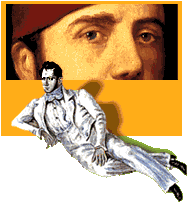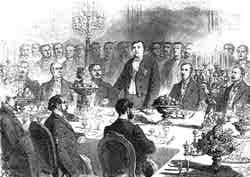 |
As cousin of Ferdinand de Lesseps, the Empress supported him from
the beginning to the end of the project, pleaded his case to Napoleon
III her husband, and quite naturally, presided as god-mother during
the inauguration of the canal. Eugenie, whom de Lesseps called
the ‘Guardian angel of the canal’, arranged numerous interviews
for him with Napoleon. Even during the project’s darkest hours,
she never ceased to play the role of intercessor between the two
men, putting before Napoleon de Lesseps’s defence against the
many criticisms levelled at the work.
During her voyage to Suez in 1869 - which the Empress considered
as her last ever ‘pleasant memory’ - to attend the inauguration
of the canal, she praised de Lesseps with these words:
Ah! What the will of man can achieve is limitless! He planted
his tent one day in the bare sand and to the whole world he said:
‘Trust me. There’s not a blade of grass here, the sun blazes down,
the desert breaks everything down, thirst is everywhere. Here,
where everything dies I shall sow life. On this wasteland there
will be fields, gardens, palaces and towns. And ships from every
nation will pass along these banks’.
Napoleon was initially reticent about de Lesseps’s plan because
of his concern to maintain stable Franco-British relations: in
fact it seemed that Franco-British co-operation and the opening
of the Suez Canal were not compatible. A letter from the Empress
to de Lesseps, dated 1855, makes reference to this difficult situation:
‘The Emperor has charged me to tell you that we must abandon our
plan. To pursue it would be to start a war between France and
England. We must bid our dream farewell!’
Without taking matters as far as war, the government was concerned
about the possibility of a cooling of relations. Even Queen Victoria
expressed to Napoleon personally her disquiet on the subject of
the realisation of such a project, to which the Emperor replied
that he could in no way intervene in a private company. During
a visit to Paris Victoria asked again:
‘My ministers are fixed in their opinions. Your Majesty could
use his influence in the affair...There are various ways of destroying
this company: the press, the authority which you wield, your ambassadors,
even the influence we have in Constantinople’.
In the face of these political threats, Emperor preferred to remain
prudent. But this in no way deterred him from encouraging de Lesseps
to persevere. In 1856, the Emperor declared to de Lesseps:
‘When you are very strong, everyone will support you, myself first
of all’.
However, despite the fact that the first time he declared himself
in favour of the canal was in 1859, it was not until 1864 that
he made his position public knowledge. The Suez Canal business
was synonymous with the prestige and influence of France in the
East - to support the canal was to defend French interests abroad.
Napoleon III therefore abandoned his softly softly approach and
openly arbitrated between the Canal company and the Ottoman Sultan.
He furthermore created a arbitration commission in March 1864,
presided over by Thouvenel, the French ambassador to Constantinople,
which gave its opinion on 19 July in the form of an imperial announcement.
In 1865, the Grand Vizir Fuad Pasha was astounded at the Emperor’s
indifference during a meeting in Marseilles. When questioned about
his attitude, Napoleon III replied with an expressive gesture
and the two words ‘the Firman’, referring officially to the Turkish
decree authorising the building of the canal. In 1867, when the
Company was experiencing financial difficulties, the Emperor put
pressure on the legislative to provide a debentured loan of 100
million Francs.
Despite his timorous attitude during the first years of the canal
building project, Napoleon III subsequently vigorously affirmed
the will of the Imperial Government to see the affair brought
to a successful conclusion. In 1869, he was held back in Paris
because of health and pressing political problems, and so was
unable to be present at the inauguration. He did however pronounce
these words in Parliament.
‘The Empress is not here today at the opening of Parliament because
it was my opinion that by her presence she represents the sympathies
of France for a work which is the result of the perseverance and
genius of the French’.
The Duc de Morny got involved in the Suez canal affair because
he was attracted by the potential profit to be had from its shares.
Having been encouraged by a group of British financiers to have
De Lesseps’s company replaced by a British publicly owned company,
Morny, with Nubar Pasha (Ismail Pasha’s minister for foreign affairs
and also in the pay of the British), attempted to compromise De
Lesseps’s company. He attacked the company both on the French
stock exchange and in the press via the newspaper of his friend
Emile de Giradin. He also spoke directly to the Emperor, using
these words:
‘De Lesseps is engaging upon a risky financial affair which would
appear impossible, he will ruin all the small investors who have
trusted him, and that will be a catastrophe. For his own good,
he must not be allowed to continue’.
He managed to have himself promoted to the role of mediator in
the Suez Canal affair. And immediately things began to resemble
a spy novel as a letter from Nubar Pasha which spelled out clearly
Morny’s role was intercepted by Tastu, the French consul in Alexandria
and sent to de Lesseps. De Lesseps counter-attacked immediately
at his next meeting with the Duke.
‘I have too high an opinion of you, My Lord, not to speak frankly
to you. You are the last person in this affair who could possibly
act as an arbitrator. I am sure that you are perfectly well aware
of some libellous remarks, according to which some of the opponents
of the canal hope that you will take action to make Nubar’s undertaking
be successful. We are talking about considerable sums of money
given or promised, and your name - it is my duty to tell you this
- has served as protection for the mission of Nubar Pasha which
the French Consul General in Egypt wished to oppose. I am sure
that you see that given the existence of such rumours, against
which I have constantly protested and which I am sure give cause
for great indignation, reticence on your part would seem to be
a necessity.
Morny moderated his attacks a little after this meeting but continued
to deal with Bulwer, the British ambassador in Constantinople.
In this shady matter of cloak and dagger diplomacy Morny was driven
by greed for personal gain. But death overcame him in 1865 preventing
him from completing his action. Bulwer himself wrote to the British
government:
‘Since M. Morny is now dead, we no longer have any hope of changing
the destination of the concession for the canal’.
Prince Napoleon was right from the beginning and right up to the
very end of the matter one of the strongest supporters of the
Suez Canal. Indeed it was the only point of which he and the Empress
saw eye to eye, their dislike for each other being well known.
With his official title as ‘Protector of the Company’, granted
in 1858 with the founding of the company, he visited the construction
works in 1863. On that occasion he offered the company a steam
launch. In February 1864 he presided over a banquet given at the
palais de l’Industrie in de Lesseps’s with 1600 guests. All the
representatives of public and private world were there, notably,
members of the Institute, the Senate, The Conseil d’Etat, right
down to humble workmen. Prince Napoleon gave a speech lasting
one and half hours in which he praised ‘the first and greatest
work of National importance driven merely by the initiative of
individuals’. He encouraged all the supporters of the canal not
to let themselves be influenced by the rumours and the attacks
levelled against such an illustrious work and its promoter:
If M. de Lesseps, with his deep knowledge of both the men and
the ways of the East, had not acted as he did, you would have
been left with piles of paper but nothing done. Persevere and
all will be yours in the end’.
Speaking as a private citizen, he expressed the wish that the
government of the Emperor ‘the natural protector of the rights
of French citizens abroad’, should be more official in its support.
This banquet and speech, widely reported by the European press,
had a strong effect on international public opinion, and the speech
was seen as France’s official position on the matter.
Extract from Monde illustré, n°358, 20 février 1864.
While it is not our remit to reproduce the speech made by the prince Napoleon, nor is it our role, as faithful chroniclers of great events, to give our opinion concerning the facts as they stand, we can nonetheless report that the warm terms in which His Imperial Highness spoke were greeted with rapturous applause, and the completion of the freshwater canal, a precursor to the forthcoming opening of the ship canal, was celebrated with all due honour.
To the right of the prince sat M. de Lesseps, to his left the admiral Jurien de la Gravière.
After the prince Napoleon, it was M. de Lesseps who took the floor and his words met with general approval.
Senator Procurator general Dupin also made a short speech characterised by that notoriously sharp verve of his; he spoke of the Suez Canal as the canal of good hope and the evening drew to a close with several vivats to his Majesty the Emperor, prince Napoleon and M. de Lesseps.
Those who have, of late, dared to maintain that the piercing of the isthmus of Suez is not an undertaking of national importance, have only to recall the banquet of 11 February 1864.
O. DE J.
 |
